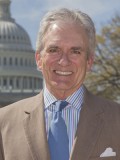 By Executive Director J. Brent Walker
By Executive Director J. Brent Walker
A New Year’s resolution to defend religious liberty in 2015? Yes, but let’s be real.
Eric Metaxas challenges us in a recent BreakPoint commentary to resolve to care more about religious liberty in the upcoming year. So far, so good. The BJC does that every year. But threats to religious liberty he mentions are mostly misleading, one-sided and cast a blind eye to the effect of the requested accommodation on people who do not share those religious views.
When defending religious liberty, we always should be vigilant both in the United States and certainly around the world where persecution of Christians and others is rampant and heartbreaking. But, when we do, we must not exaggerate the threats, be selective in the ones we identify and neglect the rights and well-being of fellow citizens of other religious traditions and those who are not religious at all.
First, take a few of the examples that Metaxas cites in his commentary:
• He laments that “Christian bakers and florists” are being told to “support” same-sex marriages or face ruinous fines. Let’s be clear: All Christians do not oppose same-sex marriage. For those who do, their church or clergy are never going to be required to perform one, period. But those on the periphery of the marital enterprise occupy a more tenuous position. Running a commercial, profit-making business usually does not suggest one supports or even agrees with the religion or lifestyle of customers or how they use their bought-and-paid-for goods and services. Stated in legalese, people who bake a cake or sell flowers may not be deemed to have their religious liberty “substantially burdened” when those inanimate items, in the stream of commerce, wind up in a same-sex marriage ceremony. These business owners perhaps have a better argument when they are asked, in effect, to be more closely involved in the wedding ceremony — say, photographers, wedding planners and musicians. The outcome of such cases remains to be determined.
• Metaxas decries the plight of the owners of Hobby Lobby being told by the Obama administration they must provide employees with a drug they believe induces abortions. He also says that religious ministries like the Catholic Little Sisters of the Poor and religiously affiliated institutions of higher learning, such as Wheaton College, should also be relieved of obligations to participate in the Affordable Care Act.
But, news flash: Hobby Lobby won! And it was no small victory. Indeed, two decades ago no one thought that large, for-profit corporations would be deemed capable of exercising religion and permitted to assert the benefits of the 1993 Religious Freedom Restoration Act. Moreover, even religiously affiliated nonprofits and colleges have been extended an accommodation to opt out of the program and, so far, received favorable attention by the courts.
• Metaxas properly points to the incident of the mayor of Houston subpoenaing the sermons of pastors. But, a stern letter to the mayor signed by many religious leaders and religious liberty advocates, including myself, quickly engendered a retraction of the subpoena.
Second, all of the issues Metaxas mentions — as well as many others who lament the decline of religious liberty in America — deal only with the free exercise of religion. Yes, free exercise is critically important. It is guaranteed in the First Amendment. But the First Amendment also bans the establishment of religion. We must enforce both of these clauses for religious freedom to be fully protected. As soon as government starts to advance religion or take sides in religious disputes favoring one religion over another, someone’s religious liberty is denied. Examples of the diminution of the Establishment Clause include: government-sponsored religious exercises in the form of legislative prayer, usually Christian prayers, that the Court recently upheld in Town of Greece v. Galloway; taxpayer funding of religious ministries and religious education; and government-sponsored religious symbols, such as crosses and crèches depicting the birth of Jesus. We must not cleave the First Amendment into an either/or proposition. Both no establishment and free exercise!
Third, certainly religious exercise should be accommodated robustly when only the rights of the religious claimant are involved. But where the well-being and rights of other citizens are thereby compromised or prejudiced — arguably, for example, the workers at Hobby Lobby who desire contraception coverage — then government (and the courts in particular) must balance the rights in conflict and render a decision that seeks a win-win result as far as is possible. Religious liberty must be accommodated, but with a watchful eye to ensure that others are not harmed. The old saw is true: the right to swing my fist ends where your nose begins.
So, yes, resolve to defend religious liberty in 2015. But when we do, we must be careful to protect everyone’s religious liberty, be as concerned about government trying to help religion as hurt it, and make sure Citizen B does not have to suffer because of Citizen A’s religious protection in our vibrant, religiously plural constitutional democracy.
From the January 2015 Report From the Capital. Click here to read the next article.





